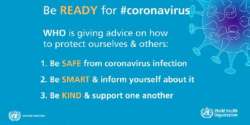Myths and the truth: Coronavirus disease advice for the public
As the news of deadly virus has spread across the world with scary headlines and warnings, people have also begun sharing cure and prevention methods to fight it. Here is a list of myths debunked by WHO.

As the news of deadly virus has spread across the world with scary headlines and warnings, people have also begun sharing cure and prevention methods to fight it.
While some of the methods shared may work as a precaution, a lot of them belong to the "fake news" bandwagon. It's anyway always necessary to fact check information with a credible source and articles published by the official government and organisational sites.
Here are the following myths about coronavirus, busted by the World Health Organisation:
1) Can the virus transmit through goods manufactured in China or any country reporting COVID-19 cases?
No. Even though the coronavirus can stay on surfaces for a few hours or up to several days (depending on the type of surface), it is very unlikely that the virus will persist on a surface after it has been moved, travelled, and exposed to different conditions and temperatures.
But for safety, wash your hands every once in a while, and clean your surroundings and gatherings which are often, touched or used by other people.
2) Can coronavirus be transmitted through mosquito bites?
There have been no cases yet that suggest coronavirus can be transmitted by mosquitoes. Coronavirus is a respiratory virus which spreads through droplets generated when an infected person coughs or sneezes, or through droplets of saliva or discharge from the nose.
Common signs of infection include respiratory symptoms, fever, cough, shortness of breath and breathing difficulties. In more severe cases, the infection can cause pneumonia, severe acute respiratory syndrome, kidney failure and even death.
Also, avoid contact with anyone who is coughing or sneezing.
3) Can regularly rinsing your nose with saline help prevent infection with the new coronavirus?
No. There is no evidence that regularly rinsing the nose with saline has protected people from infection with the new coronavirus.
4) Can eating garlic help prevent infection with the new coronavirus?
Despite the widespread rumour that eating garlic cloves boiled in water can cure the virus, the method isn't recommended by experts as garlic may provide some antimicrobial properties but there is no evidence that eating it will provide protection against the new virus.
5) Does coronavirus affect older people, or are younger people also susceptible?
People of all ages are prone to get infected by the new coronavirus (2019-nCoV). Older people and people with pre-existing medical conditions (such as asthma, diabetes, heart disease) appear to be more vulnerable to becoming severely ill with the virus. With that being said medical experts and researchers are still figuring out on who is mostly at the risk of being infected and develop severe or in worst cases lethal illness.
WHO advises people of all ages to special and additional precautions.
6) Are antibiotics effective in preventing and treating the new coronavirus?
People may use medicines to relieve the pain caused by symptoms of cough or cold, but antibiotics do not work against viruses, only bacteria.
However, if you are hospitalised for the 2019-nCoV, you may receive antibiotics because bacterial co-infection is possible.
7) Are there any specific medicines to prevent or treat the new coronavirus?
To date, there is no specific medicine recommended to prevent or treat the new coronavirus (2019-nCoV) but government and organisations are trying to develop different versions of medicines that could cure COVD-19.
According to Xu Nanping, China’s vice-minister of science and technology the first Covid-19 specific medicine will be in the form of a vaccine in China which is expected to be ready for clinical trials by the end of April.
Health experts from WHO have noted that Gilead’s remdesivir has demonstrated efficacy in treating the coronavirus infection. Gilead remdesivir is a treatment which has already been used been used to treat one infected patient in the US, and it will soon be deployed in Asia in large pair for late-stage studies.
It is also mentioned that Gilead will use 1000 COVD-19 effected patients to determine whether multiple doses of remdesivir can reverse the infection.
Even the drug which previously failed to cure the Ebola virus will be used in smaller quantities to experiment in the US and China.
India occupies the 30th position with a total of 31 cases -- of which three have totally recovered and 28 are under observation.
Stay safe and informed regarding the latest developments in COVD-19 case.
(with inputs from a WHO report)
ALSO READ I Former Denmark footballer quarantined with coronavirus
ALSO READ I IIFA 2020 to be held in Indore postponed due to Coronavirus concerns, new date to be announced later